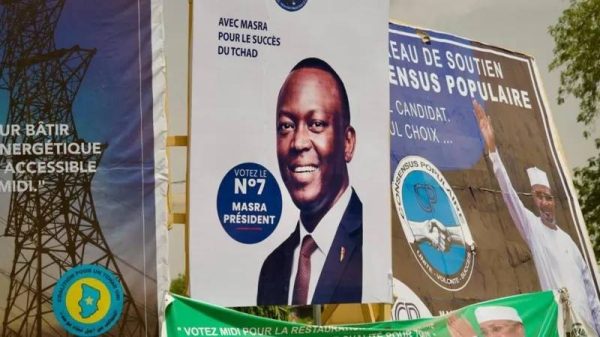N’DJAMENA — Chad is set to become the first of Africa’s current junta-led states to move to democratic rule with Monday’s presidential vote.
It will end a three-year transition imposed after the sudden death of long-serving leader Idriss Deby Itno while fighting rebels.
But as his son, and successor, Gen Mahamat Déby is one of the favorites to win, there is some scepticism about whether this will bring about change.
Prime Minister Succès Masra is among his nine challengers and is seen as his biggest rival.
Ten other politicians who had been hoping to run, including two prominent figures, Nassour Ibrahim Neguy Koursami and Rakhis Ahmat Saleh, were excluded by the constitutional council because of “irregularities”. For example, Koursami was accused of forgery.
But some have argued that the decision to bar certain people was politically motivated.
Another potential opponent, Yaya Dillo, was killed by security forces in February while allegedly leading an attack on the National Security Agency in the capital, N’Djamena.
Activists have called for a boycott of the election that they termed a ploy to lend a sheen of democratic legitimacy to the Deby dynasty.
Many are still in exile following a deadly crackdown on opponents following protests in October 2022.
Nevertheless, Chad’s election is a milestone for countries in West and Central Africa that have fallen under military rule since a spate of coups began in 2020.
It may serve as a template for juntas seeking to maintain political influence after first coming to power illegitimately.
The oil-exporting country of nearly 18 million people has not had a free-and-fair transfer of power since independence from France in 1960.
Idriss Déby overthrew Hissène Habré in 1990 and remained in charge for the following three decades until his battlefield death in April 2021 at the age of 68.
His son, now 40, took over in what opponents described as a constitutional coup and initially pledged to stay on as interim leader for just 18 months, a period that was later extended. He also said that he would not run for president.
Gen Déby has tried to dismiss concerns that he is part of a dynasty.
“If I am elected, I will serve my five-year term and at the end of my term, it will be up to the people to judge me. As for a dynasty, our constitution is very clear – a candidate cannot serve more than two successive terms, “ he told the France 24 TV channel.
Mr Masra, who is also 40, was named prime minister by Gen Déby in January after a deal was brokered to mend political fractures from the October 2022 protests.
The economist has been accused by some of betraying the opposition but he has dismissed rumours of a secret post-election power-sharing agreement with Gen Déby.
He has urged Chadians to vote for him to end six decades of “obscurity” and “darkness”.
People are desperate for change in Chad.
But when it comes to the vote, there is a mixture of hope and despair.
Hope that this vote, whoever wins, could spark a new era of young leadership in the country, but despair as over the past three decades, life has become tougher for many in the country.
The results are expected to be released by 21 May, but a second round could be held in June if no candidate gains more than 50% of the vote in the first round. — BBC
Source link : https://www.saudigazette.com.sa/article/642658/World/Africa/Chad-presidential-vote-set-to-end-military-rule
Author :
Publish date : 2024-05-06 07:00:00
Copyright for syndicated content belongs to the linked Source.
